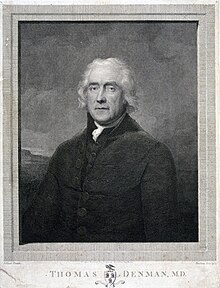Thomas Denman (physician)
Dr Thomas Denman | |
|---|---|
 portrait by William Skelton | |
| Born | 1733[1] |
| Died | 1815[1] |
| Education | Bakewell grammar school |
| Occupation | Physician |
| Parent | John |
Thomas Denman, the elder, M.D. (1733–1815) was an English physician. He was the second son of John Denman (or Thomas
Biography
Denman was educated at
In 1791, having accumulated a considerable fortune, he bought a country house at Feltham in Middlesex. He never gave up practice altogether, but limited it to consultations.
He was the first physician whose authority made the practice general in England of inducing premature labour in cases of narrow pelvis and other conditions, in which the mother's life is imperilled by the attempt to deliver at the full-time.[1]
There are three volumes of the Diaries of John Knyveton edited by Ernest Gray, published between 1937 and 1946, that are clearly based on the life of Thomas Denman, although they do not state this. The first volume has inaccuracies with regards to dates for some events but a quick analysis of the two later volumes reveals that Denman and Knyveton are the same person. Although some of the dates are incorrect, there are fewer inaccuracies than in the first volume.[4]
Family
Denman died at his town house in Mount Street, London, 26 November 1815, and was buried in the
Major publications
- A Letter to Dr. Richard Huck on the Construction and Method of using Vapour Baths, London, 1768.
- Essays on the Puerperal Fever and on Puerperal Convulsions, 1768
- An Introduction to the Practice of Midwifery, 1762 which reached a fifth edition in 1805. After his death a sixth (1824) and a seventh edition (1832) were published. These include a biographical sketch: partly autobiography memoir with a posthumous biographical addition, probably written by his son-in-law Dr Baillie and his daughter Mrs Sophia Baillie.
- Aphorisms on the Application and Use of the Forceps and Vectis on Preternatural Labours, on Labours attended with Hemorrhage and with Convulsions, 1783. It has had seven English and three American editions, and was translated into French.
- On Uterine Hemorrhages depending on Pregnancy and Parturition, 1786
- On Preternatural Labours, 1786
- On Natural Labours ; 1786
- A Collection of Engravings to illustrate the Generation and Parturition of Animals and of the Human Species. 1787
- On the Snuffles in Infants in the Medical Journal, 1790. This is the first accurate description of the nasal and laryngeal catarrh of congenital infantile syphilis.[5]
- Observations on Rupture of the Uterus,
- On the Snuffles in Infants
- On Mania Lactea, 1810
- Plates of Polypi of the Uterus, 1800
- Observations on the Cure of Cancers, 1810.
References
- ^ a b c d e f Dictionary of National Biography now in the public domain
- ^ a b History of the Village of Stoney Middleton By Thomas E. Cowen (1910) Archived 6 May 2010 at the Wayback Machine accessed 14 November 2007
- ^ online medical dictionary[permanent dead link] accessed 20 November 2007
- ^ Ernest Gray and the Diaries of John Knyveton, M.D. accessed 19 October 2013
- ^ The symptoms are accurately described, but Denman failed to discover their pathological nature, and though he had noted that calomel was sometimes useful he was criticised for not noting that mercury was considered to be a cure. His biography noted that Sir William Jenner, speaking at a royal commission in 1867, stated that he had told a clinical assistant who failed to prescribe Mercury that he was guilty of the death of the patient.
